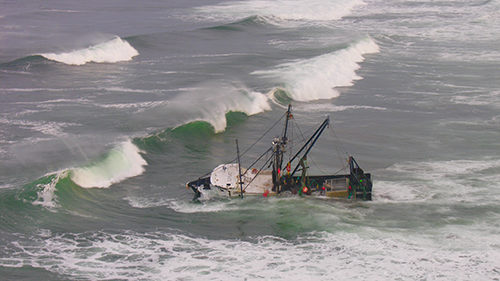The owner of the fishing trawler Privateer has been fined $7,000 for spilling approximately 3,465 gallons of diesel and lube oil when the vessel ran aground at Ocean Shores in April 2016.
The Washington Department of Ecology has also ordered JP Fishing LLC to reimburse Washington state $29,142 for its response efforts, helicopter flights, and lab sample analysis.
The vessel washed up on the beach after striking a submerged rock near the mouth of Grays Harbor on April 15. It was pounded by the surf for 22 days before responders were able to safely access it, and it took 54 days before they could dismantle and remove it. State health officials issued a warning against harvesting razor clams at Copalis Beach due to the risk of oil contamination. Nearly all of the vessel was salvaged and removed from the beach by June 7.
“Thousands of gallons of diesel and oil spilled into the ocean at one of our treasured coastal beaches. It took a toll on the environment, and required a major response effort,” said David Byers, Ecology’s spill response manager, in issuing the penalty and cost reimbursement order.
“The loss of this vessel was tragic and we are saddened by any oil spill. Vessels like the Privateer provide many jobs. These jobs include those who work on the vessel, employees at the processing plant plus many more people who handle and sell the product after processing. This vessel provided substantial support to the local economy,” said John Phillips of JP Fishing LLC, of Seattle.
Under state law, the owner also faces a Resource Damage Assessment for harm caused to public resources. When a person spills oil into Washington waters, they are responsible for adequately compensating the public for harm to their resources. This may take the form of a restoration and enhancement project or study, or the owner may be assessed a fee that is paid into a restoration fund managed by the state for such projects.
Final compensation will be determined by a committee representing state agencies that include the departments of Fish and Wildlife, Natural Resources, Health, Archaeology and Historic Preservation, and the state Parks and Recreation Commission. Ecology chairs the committee.


